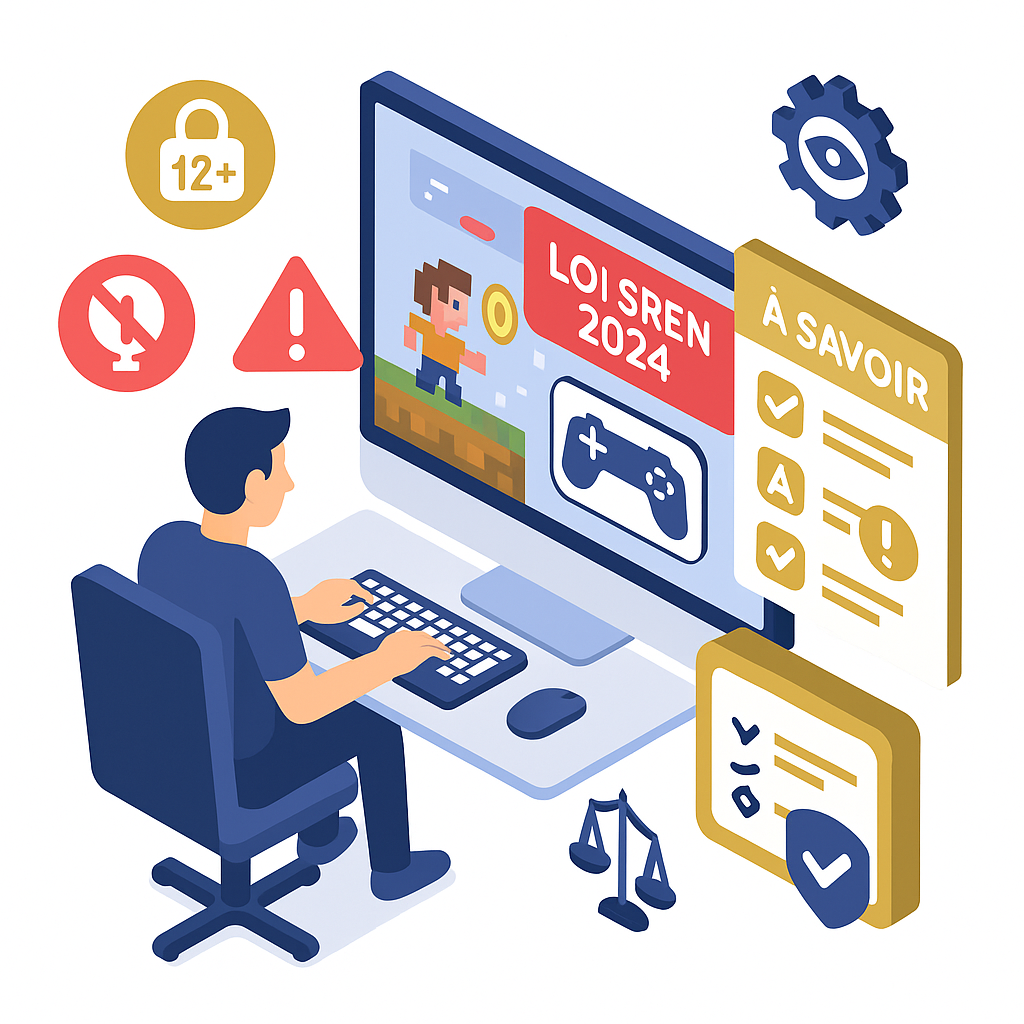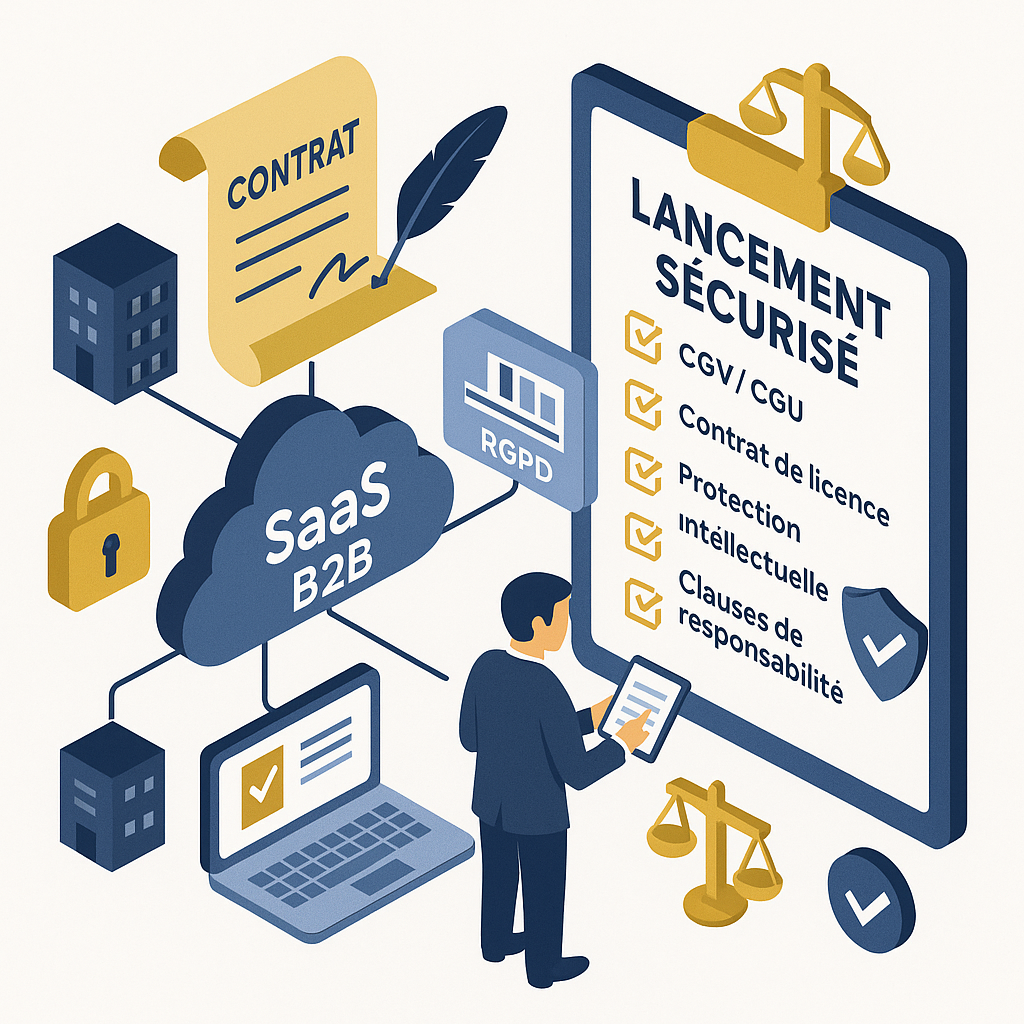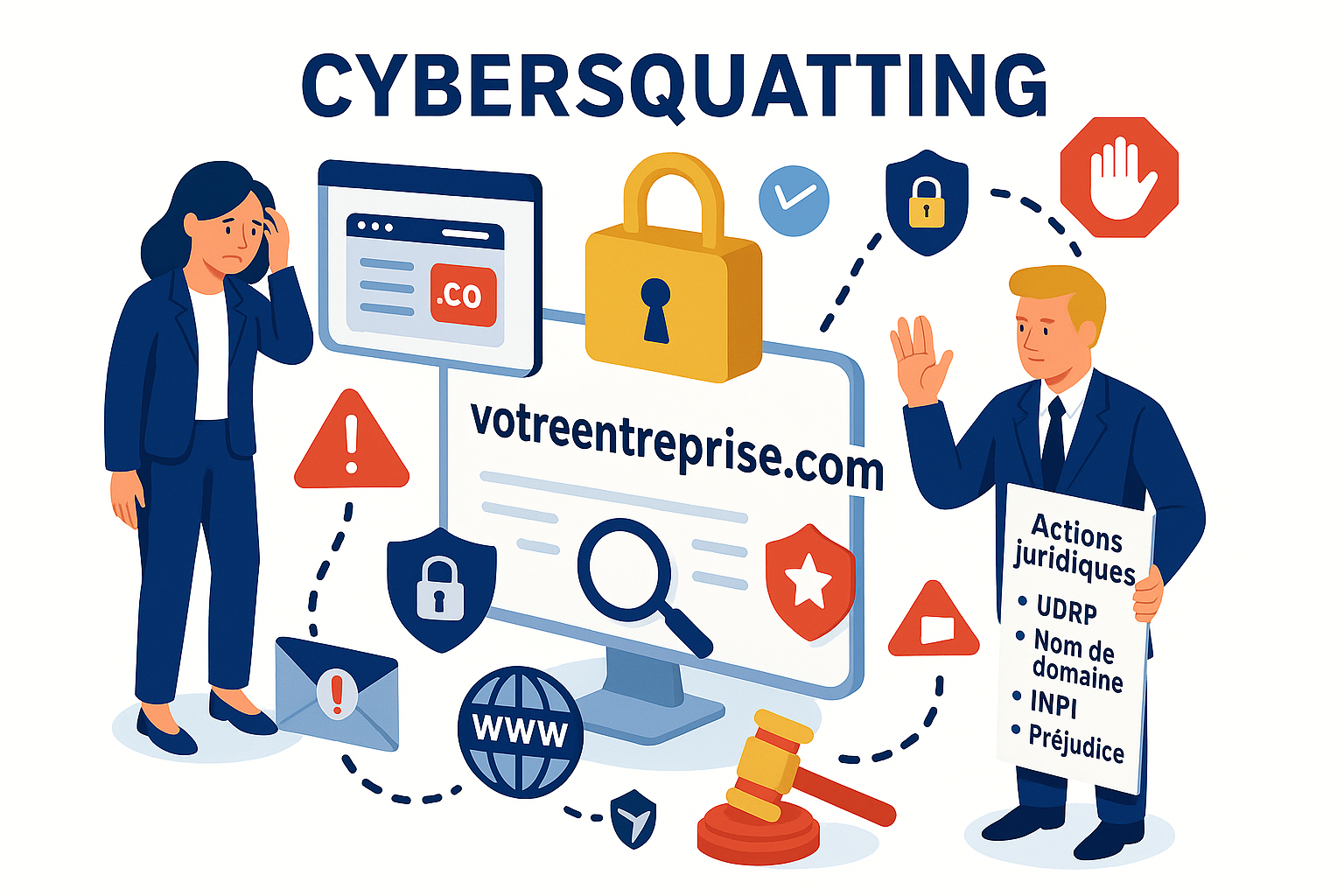En mai 2024, la France a franchi un pas décisif dans l’encadrement des économies numériques émergentes avec l’adoption de la loi SREN (Sécurisation et Régulation de l’Espace Numérique). Parmi les nombreuses dispositions de ce texte, les articles 40 et 41 ont particulièrement retenu l’attention des développeurs de jeux vidéo et des entreprises du secteur.
Pour la première fois, le législateur français instaure un cadre expérimental autorisant les jeux en ligne permettant de gagner des objets numériques monétisables par le hasard. Une véritable révolution dans un pays traditionnellement strict en matière de jeux d’argent.
Si vous souhaitez avoir recours à un avocat pour les jeux en ligne, contactez-moi !
Un cadre expérimental inédit pour les objets numériques monétisables
La loi SREN introduit une expérimentation de trois ans permettant aux joueurs majeurs de gagner, par le hasard, des objets numériques dotés d’une valeur. Cette disposition constitue une avancée significative pour l’industrie du jeu vidéo qui reposait jusqu’alors sur des modèles économiques ambigus concernant les loot boxes et autres mécanismes aléatoires de récompense.
Cette évolution était attendue depuis longtemps par le secteur. En effet, le marché mondial des objets virtuels représente aujourd’hui plusieurs dizaines de milliards d’euros, et les éditeurs français se trouvaient désavantagés par l’absence de cadre juridique clair. Désormais, ils peuvent développer des fonctionnalités basées sur l’aléa, à condition de respecter les garde-fous stricts posés par la loi.
Le texte définit les objets numériques monétisables comme des éléments de jeu conférant des droits spécifiques aux joueurs et pouvant être cédés à des tiers. Cette définition englobe donc potentiellement les avatars, équipements, terrains virtuels et autres assets que l’on retrouve dans les jeux modernes. Il est toutefois crucial de noter que ces objets ne peuvent être échangés contre de l’argent réel ni rachetés par l’entreprise de jeux ou ses partenaires, ce qui les distingue fondamentalement des jetons non fongibles (NFT) traditionnels.
Les obligations déclaratives : une étape préalable incontournable
Pour les développeurs souhaitant intégrer des mécanismes d’objets numériques monétisables dans leurs jeux, la première étape consiste à effectuer une déclaration préalable auprès de l’Autorité Nationale des Jeux (ANJ). Cette formalité n’est pas anodine – elle constitue un prérequis absolu pour opérer légalement.
La déclaration devra contenir des informations précises dont le détail sera fixé par décret. D’après les premiers éléments disponibles, les entreprises devront notamment fournir :
- Une description détaillée des mécanismes de jeu et de la nature des objets numériques proposés
- Les mesures techniques mises en œuvre pour vérifier l’âge des joueurs
- Les dispositifs de prévention du jeu excessif et pathologique
- Les moyens dédiés à la sécurité des transactions et à la lutte contre la fraude
Par ailleurs, seules les entreprises ayant leur siège social dans l’Union européenne ou un pays de l’Espace économique européen ayant conclu des accords de lutte contre la fraude avec la France pourront proposer ces jeux sur le territoire français. Cette disposition vise à éviter l’émergence d’opérateurs offshore échappant à toute régulation.
Vérification d’identité et protection des mineurs : une responsabilité majeure
La protection des joueurs mineurs constitue l’une des préoccupations centrales du législateur. La loi impose aux développeurs de mettre en place des mécanismes stricts de vérification d’âge et d’identité. Il ne s’agit plus simplement de demander à l’utilisateur de cocher une case attestant de sa majorité, mais bien d’implémenter des solutions techniques robustes.
Le texte précise que la participation aux jeux à objets numériques monétisables est strictement réservée aux personnes majeures. Les entreprises devront donc mettre en œuvre des mécanismes de vérification conformes au RGPD, ce qui implique généralement une vérification en deux temps : une première déclaration de l’utilisateur, puis une validation par un document d’identité ou un autre moyen technique fiable.
Cette obligation soulève des défis techniques et juridiques considérables pour les développeurs. La vérification d’identité doit être suffisamment robuste pour éviter tout contournement, tout en restant respectueuse de la vie privée des utilisateurs et conforme aux exigences du RGPD. Une équation complexe qui nécessite souvent l’accompagnement d’un avocat jeux d’argent familier avec ces problématiques spécifiques.
L’enjeu est d’autant plus important que les sanctions en cas de manquement peuvent être sévères, allant de l’amende administrative à la fermeture pure et simple du service. La responsabilité pénale des dirigeants peut également être engagée en cas de défaillance systémique dans la protection des mineurs.
Comparaison internationale : la France en position médiane
Le cadre français se positionne de façon intéressante sur l’échiquier international de la régulation des objets numériques dans les jeux. Si certains pays, notamment asiatiques comme le Japon ou la Corée du Sud, ont adopté depuis plusieurs années des approches permissives ayant favorisé l’essor de leurs industries vidéoludiques, d’autres territoires maintiennent des positions beaucoup plus restrictives.
La Belgique, par exemple, a qualifié certaines loot boxes de jeux de hasard dès 2018, contraignant plusieurs éditeurs majeurs à modifier leurs jeux spécifiquement pour ce marché. À l’inverse, certains États américains comme le Nevada ont développé des cadres plus libéraux, tout en maintenant des exigences strictes en matière de transparence et de protection des consommateurs.
La France choisit une voie médiane, avec cette expérimentation encadrée. Cette approche pragmatique permet d’observer les développements du marché tout en gardant la possibilité d’ajuster le cadre réglementaire à l’issue de la période de trois ans. Pour les développeurs, cela implique de concevoir des systèmes suffisamment flexibles pour s’adapter aux évolutions futures de la législation.
Implications fiscales : un terrain encore flou
L’un des aspects les moins définis de cette nouvelle réglementation concerne le traitement fiscal des transactions impliquant des objets numériques monétisables. Si la loi SREN pose les bases du cadre juridique, elle reste relativement silencieuse sur les aspects fiscaux.
Les éditeurs devront néanmoins anticiper plusieurs questions cruciales : Comment déclarer les revenus générés par la vente initiale de ces objets ? Les éventuelles plus-values réalisées par les joueurs lors de cessions ultérieures sont-elles imposables ? Quelles sont les obligations en matière de TVA pour ces transactions particulières ?
L’administration fiscale n’a pas encore publié de doctrine spécifique sur ces questions. Dans l’attente de clarifications, les développeurs auraient intérêt à adopter l’approche la plus prudente possible, en documentant précisément leurs flux financiers et en appliquant par défaut le régime fiscal des biens incorporels.
Cette incertitude fiscale représente un risque non négligeable pour les entreprises du secteur. Un redressement fiscal pourrait en effet compromettre la viabilité économique de projets basés sur ces nouveaux modèles de monétisation. Une consultation préalable auprès d’experts comptables et fiscalistes spécialisés dans l’économie numérique est donc vivement recommandée avant tout lancement commercial.
Stratégies de conformité pour les développeurs
Pour naviguer efficacement dans ce nouveau cadre réglementaire, les développeurs et éditeurs de jeux devraient adopter une approche méthodique de mise en conformité. Il est recommandé de procéder par étapes, en commençant par une analyse approfondie des mécanismes de jeu envisagés au regard des critères définis par la loi SREN.
Cette analyse doit porter tant sur les aspects techniques (implémentation des systèmes de vérification d’âge, sécurisation des transactions) que sur les dimensions juridiques (rédaction des conditions générales d’utilisation, définition de la nature contractuelle des objets numériques). Une documentation rigoureuse de cette démarche constituera un atout précieux en cas de contrôle par les autorités.
La transparence vis-à-vis des joueurs constitue également un axe majeur de conformité. Les développeurs doivent clairement informer les utilisateurs sur la nature des objets numériques, leurs probabilités d’obtention et les limitations inhérentes à leur utilisation. Ces informations doivent être facilement accessibles et compréhensibles, afin d’éviter toute accusation de pratiques commerciales trompeuses.
Enfin, il est crucial d’intégrer la conformité dès la phase de conception du jeu (« compliance by design »), plutôt que de tenter d’adapter a posteriori des mécaniques non conformes. Cette approche préventive permet non seulement de minimiser les risques juridiques, mais également d’optimiser les coûts de développement en évitant des modifications structurelles tardives. L’accompagnement d’un avocat spécialisé en droit du numérique facilite cette approche intégrée.
Perspectives d’avenir : vers une pérennisation du modèle ?
La nature expérimentale du dispositif introduit par la loi SREN soulève logiquement la question de sa pérennité. À l’issue de la période de trois ans, le législateur devra évaluer les bénéfices et les risques de ce nouveau cadre avant de décider de son maintien, de son évolution ou de son abandon.
Cette évaluation prendra vraisemblablement en compte plusieurs critères : l’impact économique sur l’industrie française du jeu vidéo, les éventuelles dérives constatées en termes d’addiction ou de protection des mineurs, et la capacité des acteurs à respecter les garde-fous imposés par la loi.
Les développeurs ont donc tout intérêt à adopter une attitude exemplaire pendant cette période transitoire, afin de démontrer la viabilité et la responsabilité du modèle. Cela passe notamment par une vigilance accrue concernant les joueurs problématiques, une transparence totale sur les mécanismes aléatoires, et une volonté constante de dialoguer avec les autorités de régulation.
À terme, on peut raisonnablement envisager une évolution vers un cadre pérenne, potentiellement assorti de quelques ajustements basés sur les observations de la période expérimentale. Les entreprises qui auront su anticiper ces évolutions en adoptant d’emblée les standards les plus exigeants disposeront alors d’un avantage compétitif significatif.
Pour résumer
La loi SREN marque indéniablement un tournant majeur pour l’industrie française du jeu vidéo. En autorisant, même à titre expérimental, les jeux à objets numériques monétisables, le législateur reconnaît l’évolution des modèles économiques du secteur et offre aux acteurs français l’opportunité de se positionner sur un marché en pleine expansion.
Toutefois, cette ouverture s’accompagne d’exigences strictes qui ne doivent pas être sous-estimées. Vérification d’âge, prévention de l’addiction, transparence des mécanismes, déclarations préalables… Les obligations sont nombreuses et leur non-respect peut entraîner des sanctions sévères.
Dans ce contexte, les développeurs et éditeurs ont tout intérêt à s’entourer des expertises nécessaires pour naviguer sereinement dans ce nouveau cadre réglementaire.Un avocat spécialisé en jeux en ligne peut les accompagner à chaque étape. Car au-delà de la simple conformité légale, c’est bien la confiance des joueurs et la pérennité de leurs modèles économiques qui sont en jeu.




